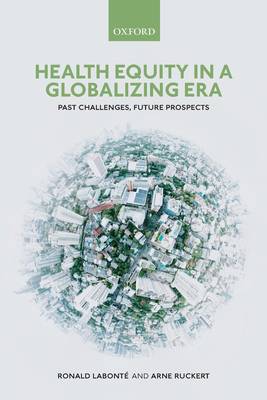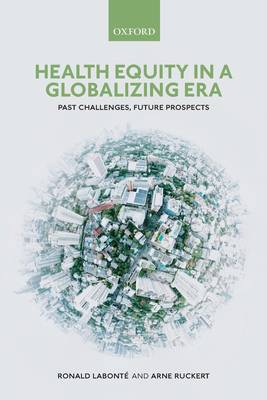
Wil je zeker zijn dat je cadeautjes op tijd onder de kerstboom liggen? Onze winkels ontvangen jou met open armen. Nu met extra openingsuren op zondag!
- Afhalen na 1 uur in een winkel met voorraad
- Gratis thuislevering in België vanaf € 30
- Ruim aanbod met 7 miljoen producten
Wil je zeker zijn dat je cadeautjes op tijd onder de kerstboom liggen? Onze winkels ontvangen jou met open armen. Nu met extra openingsuren op zondag!
- Afhalen na 1 uur in een winkel met voorraad
- Gratis thuislevering in België vanaf € 30
- Ruim aanbod met 7 miljoen producten
Zoeken
Health Equity in a Globalizing Era
Past Challenges, Future Prospects
Ronald Labonté, Arne Ruckert
Paperback | Engels
€ 127,45
+ 254 punten
Omschrijving
Why do some countries and populations suffer from poverty and ill health, whilst others are more prosperous and healthy? What are the inherently global (trans-border) issues that affect inequities in disease burden and health opportunities for individuals and nations? Traditionally, the focus of global health has been 'international health': the concern for high burdens of disease in generally low-income countries. To answer these questions however, we need to modernise our understanding of globalization as a phenomenon. Health Equity in a Globalizing Era: Past Challenges, Future Prospects examines how globalization processes since the on-set of neoliberalism affect equity in global health outcomes, and emphasises access to important social determinants of health. With a basis in political economy, the book covers key globalization concepts and theory, and presents a thorough background to the field. Case studies, illustrations, and new research all combine to make this title a comprehensive and current discussion of the various pathways that connect globalization to health equity outcomes. It looks at changes in migration, labour markets, trade and investment rules, international development assistance, health systems, infectious and non-communicable disease risks, environmental health, and gendered aspects of globalization's health dialectic. In addition, it argues for a reform of the global governance structure, the significant role of human rights, and the importance of a strong civil society in achieving greater social justice in health. Ideal for senior undergraduate and graduate students in global health programs, global health scholars and practitioners in government policy and health/development NGOs, Health Equity in a Globalizing Era: Past Challenges, Future Prospects is a significant contribution to our new understanding of globalization and global public health.
Specificaties
Betrokkenen
- Auteur(s):
- Uitgeverij:
Inhoud
- Aantal bladzijden:
- 464
- Taal:
- Engels
Eigenschappen
- Productcode (EAN):
- 9780198835356
- Verschijningsdatum:
- 14/05/2019
- Uitvoering:
- Paperback
- Formaat:
- Trade paperback (VS)
- Afmetingen:
- 155 mm x 231 mm
- Gewicht:
- 703 g

Alleen bij Standaard Boekhandel
+ 254 punten op je klantenkaart van Standaard Boekhandel
Beoordelingen
We publiceren alleen reviews die voldoen aan de voorwaarden voor reviews. Bekijk onze voorwaarden voor reviews.











